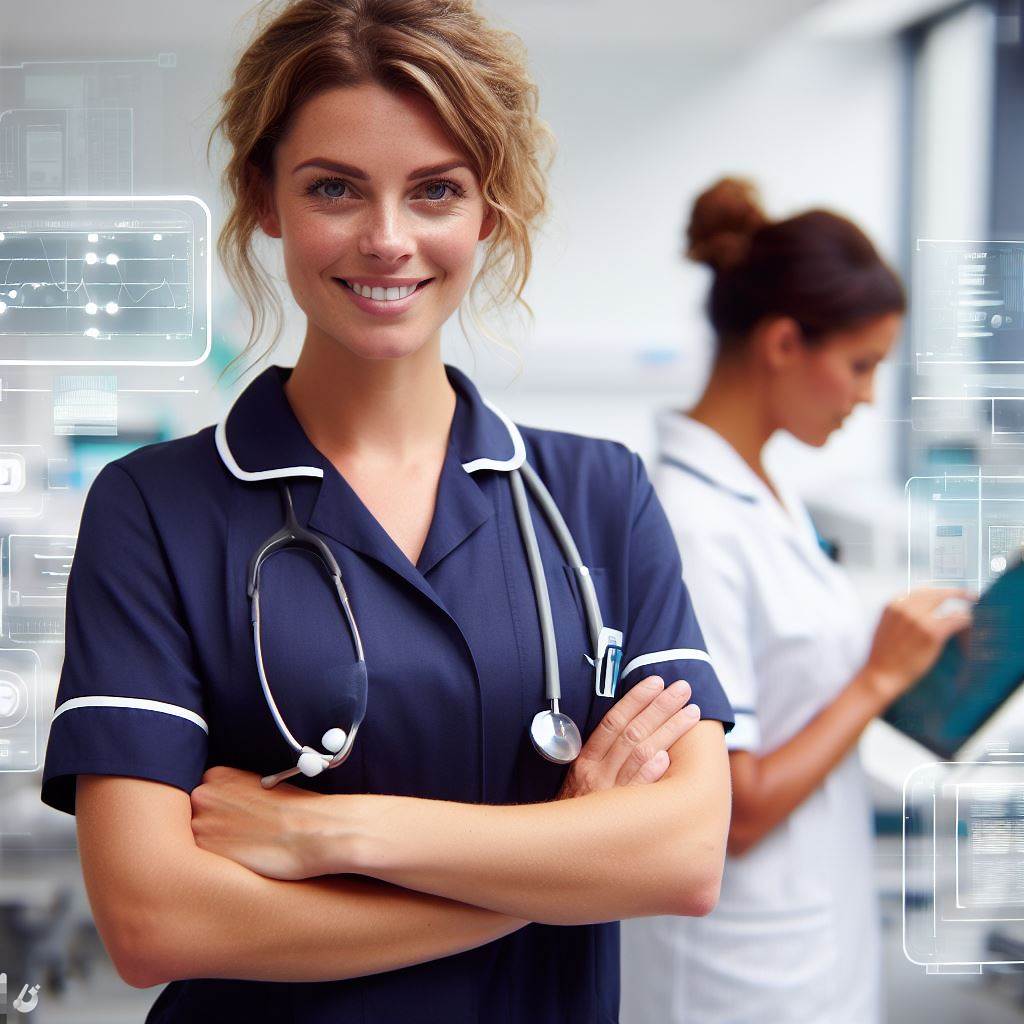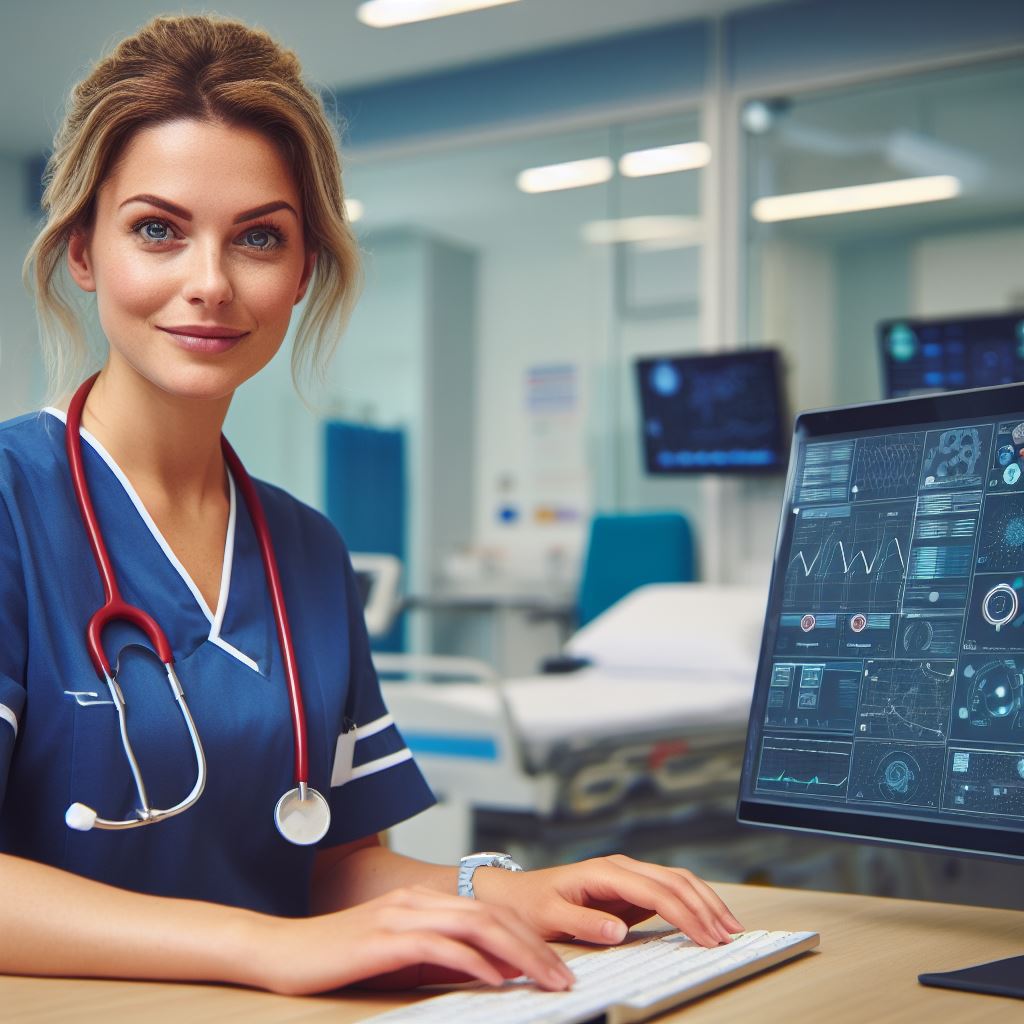Introduction
Technology has transformed the field of nursing in the UK, revolutionizing patient care and enhancing efficiency.
This blog section aims to explore the significant impact that technology has had on the nursing profession in the UK.
Nursing in the UK is a vital profession that encompasses the care and support of individuals, families, and communities to promote wellbeing and recovery.
It involves a wide range of responsibilities, including administering medication, providing emotional support, and coordinating patient care.
With the advancements in technology, nurses now have access to various innovative tools and equipment that significantly contribute to improving patient outcomes.
Electronic health records enable healthcare professionals to easily access patient information and share it across different healthcare settings, ensuring continuity and facilitating collaboration among multidisciplinary teams.
Moreover, the use of telemedicine and remote monitoring systems has allowed nurses to connect with patients in rural and remote areas, enabling access to healthcare services that were previously limited.
This technology also provides an opportunity for nurses to monitor patients’ conditions remotely, reducing the need for hospital visits and improving overall patient convenience.
Additionally, the development of communication technology has transformed the way nurses interact with patients, colleagues, and other healthcare professionals.
Mobile devices and secure messaging applications have facilitated quick and effective communication, allowing nurses to promptly address patient concerns and collaborate more efficiently.
In general, technology has had a profound impact on the nursing profession in the UK. It has improved patient care, streamlined processes, and expanded the reach of healthcare services.
As technology continues to evolve, nurses must adapt and embrace these advancements to ensure the delivery of high-quality, patient-centered care.
Role of technology in nursing
Adoption and integration of technology in healthcare
- Nursing in the UK has witnessed a significant adoption and integration of technology.
- Healthcare organizations are increasingly incorporating technology to streamline processes and enhance efficiency.
- Electronic health records (EHR) are now commonly used, enabling nurses to access patient information quickly.
- Communication tools such as smartphones and secure messaging systems have improved collaboration among healthcare professionals.
- Telehealth and remote monitoring solutions have enabled nurses to provide care to patients in remote areas.
- Robotic systems are being utilized in surgeries, assisting nurses in delivering precise and minimally invasive procedures.
- The adoption of technology has become essential for nurses to keep up with the evolving healthcare landscape.
- Training programs have been developed to equip nurses with the necessary skills to effectively use technology.
- The integration of technology in nursing practice has led to improved efficiency and better patient outcomes.
Importance of technology in improving patient care and outcomes
- Technology has revolutionized patient care, leading to improved outcomes and enhanced patient safety.
- Electronic medication administration systems help nurses in accurately administering medications, reducing the risk of errors.
- Advanced monitoring devices provide real-time data, allowing nurses to identify and address patient issues promptly.
- Smart wearables enable continuous monitoring of vital signs, providing nurses with valuable information on patient health.
- Technology-assisted communication allows nurses to stay connected with patients, offering support and education remotely.
- Artificial intelligence and machine learning algorithms enable nurses to analyze large volumes of patient data for personalized care.
- Technology-based education platforms provide nurses with access to up-to-date information and training resources.
- Virtual reality simulations help nurses practice different scenarios and enhance their clinical skills.
- Healthcare apps and telemedicine services enhance patient engagement and accessibility to care.
- The use of technology in nursing has transformed healthcare delivery, making it more efficient and patient-centered.
In essence, the role of technology in nursing in the UK cannot be understated. The adoption and integration of technology have become vital for nurses to provide quality care.
Technology has improved efficiency in healthcare processes, facilitating better communication and collaboration among healthcare professionals.
Moreover, it has significantly enhanced patient care and outcomes through accurate medication administration, advanced monitoring systems, and personalized care based on data analysis.
Technology-assisted education and virtual simulations further strengthen nursing skills and knowledge.
Overall, technology has revolutionized nursing practice, making it more effective, efficient, and patient-centered.
Read: Becoming a Marriage Therapist in the UK: A Guide
Technological advancements in nursing
In recent years, the nursing profession in the UK has witnessed a remarkable transformation due to the rapid advancements in technology.
These technological innovations have significantly impacted various aspects of nursing, leading to improved patient care, enhanced efficiency, and increased access to healthcare services.
This blog section explores the key technological advancements in nursing and their impact on the healthcare system in the UK.
Electronic health records (EHRs)
Electronic health records (EHRs) have revolutionized the way healthcare providers store and access patient information.
The implementation of EHRs brings both benefits and challenges. One of the major advantages is the digitization of patient data, which eliminates the need for paper-based records.
EHRs also facilitate easy sharing of patient information among healthcare professionals, thus promoting better coordination of care.
However, challenges such as data security and privacy concerns, as well as the initial cost of implementing EHR systems, must be addressed.
Despite these challenges, the adoption of EHRs has led to improved access to patient information, allowing healthcare providers to make quicker and more informed decisions regarding patient care.
Telehealth and telemedicine
Telehealth refers to the use of technology to provide healthcare services remotely. Telemedicine, a subset of telehealth, involves the delivery of clinical services through virtual platforms.
This technology has revolutionized access to healthcare, particularly in rural areas where physical access to healthcare facilities may be limited.
Telemedicine enables healthcare professionals to provide remote patient care and consultations through videoconferencing, reducing the need for patients to travel long distances.
The purpose of telehealth is to enhance healthcare accessibility and bridge the gap between patients and healthcare providers.
This technology has proven especially useful during the COVID-19 pandemic, as it ensures continuity of care while minimizing the risk of virus transmission.
Telehealth has the potential to transform the way healthcare services are delivered and accessed in the UK.
Medical devices and equipment
Advancements in technology have introduced innovative tools and devices in healthcare settings, significantly enhancing patient monitoring, diagnostics, and treatment.
From smart wearable devices that track vital signs to advanced imaging and diagnostic equipment, these innovations have revolutionized patient care.
Medical devices play a crucial role in monitoring patients remotely and in real-time, allowing healthcare providers to intervene promptly in case of any alarming changes in patient conditions.
These devices enable patients to engage in self-monitoring, empowering them to actively participate in their own care.
Personalized UK Career Consulting
Receive tailored career guidance designed just for you. Get actionable steps and expert support to boost your career in 1-3 days. Take control of your career now.
Get StartedThe introduction of advanced medical equipment has also improved diagnostics and treatment options.
Technological advancements in imaging, such as magnetic resonance imaging (MRI) and computed tomography (CT) scans.
Provide healthcare professionals with more accurate and detailed information for proper diagnosis.
Furthermore, innovative treatment devices and techniques have enhanced therapeutic outcomes and reduced the invasiveness of certain procedures.
In review, technology has had a significant impact on nursing in the UK.
Electronic health records have transformed the way patient information is stored and accessed, improving care coordination and decision-making.
Telehealth and telemedicine have increased accessibility to healthcare services, particularly in remote areas.
The introduction of innovative medical devices and equipment has revolutionized patient monitoring, diagnostics, and treatment.
These technological advancements have undoubtedly contributed to the enhancement of patient care and the overall healthcare system in the UK.
Read: UK Doctors’ Role in Public Health Policy

Benefits of technology in nursing
Enhanced efficiency and accuracy in patient care
- The use of technology in nursing has greatly increased the efficiency of patient care.
- Electronic health records allow nurses to access patients’ medical history and records quickly and accurately.
- Mobile apps and devices enable nurses to monitor patients’ vital signs and provide real-time updates.
- Automated medication dispensing systems reduce human error in administering medications.
- Use of smart technology and wearables improve patient monitoring and early detection of medical complications.
Improved communication and collaboration among healthcare professionals
- Technology allows for seamless communication and collaboration between healthcare professionals.
- Electronic messaging systems enable nurses to communicate quickly and efficiently with doctors and other team members.
- Teleconferencing and video calling facilitate virtual collaboration, especially in remote or rural areas.
- Digital platforms provide a centralized space for sharing patient information and coordinating care.
- Remote monitoring and telemedicine enable nurses to consult with specialized healthcare professionals for better patient outcomes.
Increased patient engagement and empowerment
- Technology empowers patients to take an active role in their own healthcare.
- Patient portals and online platforms provide access to medical records, test results, and educational resources.
- Mobile health apps help patients track their health metrics, manage chronic conditions, and adhere to treatment plans.
- Telehealth services enable patients to receive care from the comfort of their homes, increasing convenience and accessibility.
- Virtual support groups and online communities connect patients with similar conditions for knowledge sharing and emotional support.
Expansion of nursing roles and opportunities
- Advancements in healthcare technology have opened up new roles and opportunities for nurses.
- Nurses can specialize in informatics, using technology to analyze and manage healthcare data.
- Telehealth nursing allows for remote patient monitoring, triage, and follow-up care.
- Nursing research and clinical trials benefit from technology, leading to advancements in evidence-based practice.
- Technology-driven innovations create avenues for nurses to contribute to health policy development and advocacy.
In short, technology has significantly impacted nursing in the UK, bringing numerous benefits.
Enhanced efficiency, improved communication, increased patient engagement, and expanded nursing roles are just a few of the advantages that technology offers to the nursing profession.
Embracing technology can lead to better patient outcomes, increased job satisfaction for nurses, and improved healthcare delivery overall.
Read: Mental Health Support for UK Doctors
Challenges and considerations
Data privacy and security concerns
- Data breaches and unauthorized access to patient information can compromise patient privacy.
- Stringent measures must be put in place to protect patient data from cyberattacks.
- Nursing professionals need to be trained in data security protocols and adhere to strict confidentiality standards.
In the rapidly evolving landscape of technology in nursing, it is important to address the challenges and considerations that come with its adoption.
Data privacy and security concerns are of utmost importance, as breaches can compromise patient confidentiality.
Nurses need to be well-versed in data security protocols and maintain strict confidentiality standards.
Technological literacy and training for healthcare professionals
- Healthcare professionals must acquire the necessary skills to effectively use and navigate advanced healthcare technologies.
- Ongoing training programs should be provided to ensure healthcare professionals stay up-to-date with technological advancements.
- Lack of technological literacy can hinder the integration and utilization of technology in nursing practice.
Furthermore, technological literacy among healthcare professionals is crucial to effectively utilize advanced healthcare technologies.
Continuous training programs should be implemented to ensure healthcare professionals stay updated with the latest advancements.
The lack of technological literacy can impede the integration and utilization of technology in nursing practice.
Potential for depersonalized patient interactions
- Increased reliance on technology may lead to reduced face-to-face interactions with patients.
- Nurses must find ways to maintain a compassionate and personal connection with patients while utilizing technology.
- Striking a balance between technology and human touch is crucial to provide holistic and patient-centered care.
While technology offers numerous benefits, there is a potential for depersonalized patient interactions.
Nurses must strike a balance between utilizing technology and maintaining a compassionate and personal connection with patients. This human touch is key to providing holistic and patient-centered care.
Ethical considerations in the use of technology in nursing
- The use of technology raises ethical questions surrounding issues such as patient autonomy and consent.
- Nurses must navigate dilemmas related to the appropriate use of technology and respect for patient rights.
- Ensuring ethical guidelines and frameworks are in place is essential to avoid potential harm to patients.
Lastly, ethical considerations arise from the use of technology in nursing. Patient autonomy and consent need to be respected
And dilemmas surrounding the appropriateness of technology usage must be navigated by nurses.
Establishing ethical guidelines and frameworks is vital to ensure the ethical use of technology in nursing and prevent potential harm to patients.
Essentially, the integration of technology in nursing brings forth various challenges and considerations.
Data privacy and security, technological literacy, depersonalized interactions, and ethical dilemmas require careful attention.
By addressing these challenges, nurses can harness the full potential of technology to enhance patient care and outcomes.
Read: A Day in the Life of a UK Nurse: Real Stories
Future prospects and trends
Emerging technologies in nursing
- Telemedicine: The use of technology to provide healthcare services remotely, improving access and efficiency.
- Robotics: Robotic assistants can support nurses in tasks like medication administration and patient monitoring.
- Artificial Intelligence (AI): AI systems can analyze large amounts of data to help nurses make better decisions and improve patient outcomes.
- Virtual reality (VR) and augmented reality (AR): These technologies can enhance nursing education and training, allowing for realistic simulations and practice.
Importance of continuous learning and adaptation to technological advancements
- Nurses need to stay updated with emerging technologies and understand how to best leverage them in their practice.
- Continuous learning is essential to ensure nurses can effectively use new technologies and adapt to changes in healthcare settings.
- Nursing education programs should incorporate training on emerging technologies to prepare future nurses adequately.
- Nurses should engage in professional development activities to enhance their knowledge and skills related to technology.
- Adopting new technologies can improve patient care, increase efficiency, and reduce healthcare costs.
- Technology can assist nurses in managing complex patient information, ensuring accurate documentation, and promoting patient safety.
- Integration of technology can automate routine tasks, enabling nurses to focus on direct patient care and critical thinking.
- Emerging technologies can facilitate communication and collaboration among healthcare providers, improving care coordination.
- Patient engagement can be enhanced through the use of technology, allowing patients to access information, participate in their care, and improve health outcomes.
- Technological advancements offer opportunities for research and innovation in nursing, leading to improved evidence-based practice and quality improvement.
Generally, the impact of technology on nursing in the UK is significant and the future prospects and trends hold great promise.
The emergence of technologies like telemedicine, robotics, AI, and VR/AR presents new opportunities to enhance nursing practice, improve patient care, and advance healthcare outcomes.
Continuous learning and adaptation to technological advancements are crucial for nurses to effectively utilize these emerging technologies.
It is essential for nursing education programs to incorporate training on technology and for nurses to actively engage in professional development activities.
As technology continues to evolve, nurses must embrace these advancements to provide the best possible care and remain at the forefront of healthcare innovation.
Read: Nursing Specialties in the UK: A Detailed Guide
Your Dream Job Starts with a Perfect CV
Get a tailored CV and cover letter that captures your unique strengths and stands out in your industry. Let us help you make an unforgettable first impression.
Get StartedConclusion
Technology has greatly influenced the nursing field in the UK. It has revolutionized patient care, making it more efficient and accurate.
Nurses now have access to advanced medical devices and electronic health records. This has improved diagnosis, treatment, and monitoring of patients.
Communication amongst healthcare professionals and patients is also enhanced. Technology has increased patient engagement and empowerment in managing their health.
However, it is important for nurses to actively embrace and harness these innovations. By continuously updating their skills and knowledge, nurses can maximize the use of technology.
They must also advocate for the integration of technological advancements in healthcare facilities. This will ultimately lead to improved patient outcomes and overall quality of care.
Embracing technology will enhance efficiency, accuracy, and enhance the patient experience. Nurses should see technology as a tool that complements their expertise, not a replacement.
It is crucial for nurses to stay informed about emerging technologies and incorporate them into their practice.
By doing so, nurses can provide optimal care, meet the evolving needs of patients, and contribute to advancing the nursing profession.
In the end, technology is a powerful force that has forever transformed nursing in the UK. Nurses should seize the opportunity to embrace and harness technological innovations for improved patient care.
[E-Book for Sale]
500 Cutting-Edge Tech Startup Ideas for 2024 & 2025: Innovate, Create, Dominate
$19.99 • 500 Tech Startup Ideas • 62 pages
You will get inspired with 500 innovative tech startup ideas for 2024 and 2025, complete with concise descriptions to help you kickstart your entrepreneurial journey in AI, Blockchain, IoT, Fintech, and AR/VR.




